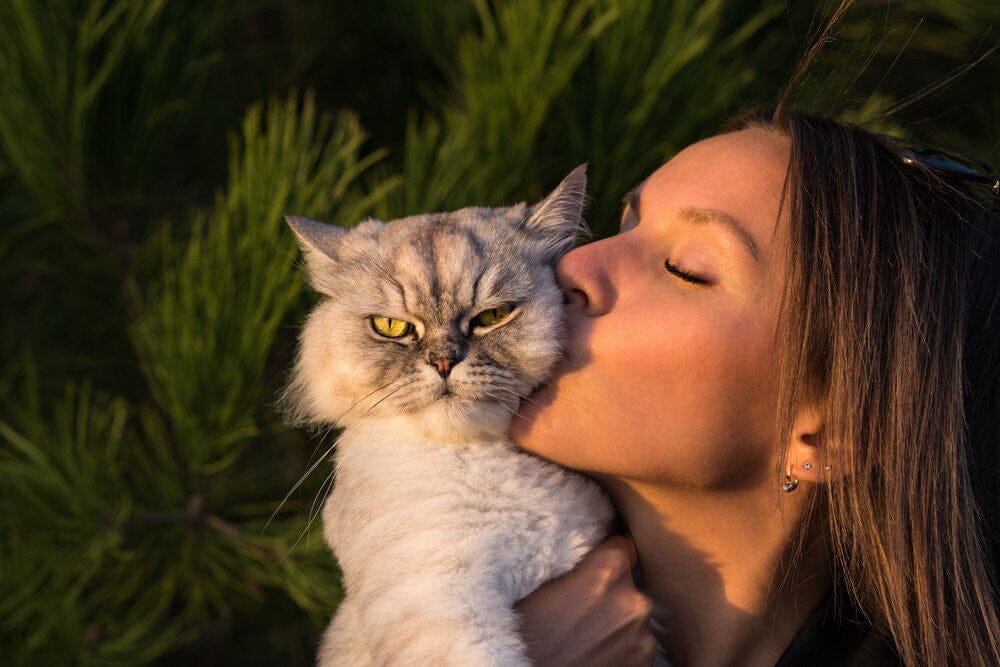May 7, 2023 |7 min read
How to Tell If Your Cat is Upset With You

Written by

Do you have an upset cat or are you feeling like your cat is giving you the cold shoulder? Cats have a reputation for being independent and aloof, but they are also highly expressive creatures that can communicate their feelings through body language and vocalizations. If you're wondering how to tell if your cat is upset with you, here are some signs to look out for.
Understanding Your Cat's Body Language
Cats use their body language to communicate their emotions, and their postures can tell you a lot about how they're feeling. If you’re wondering, “Is my cat happy?” you’ll be able to tell because happy cats are usually relaxed, with their ears and tail in a neutral position. However, if you have an upset or grumpy cat, you may notice the following changes in their body language:
- Ears flattened back against the head
- Tail twitching or lashing
- Arched back
- Flattened whiskers
- Dilated pupils
If you notice any of these signs, you may have an upset cat, and it's important to address the issue.
Cat Litter That Prioritizes Their
Health & Your Happiness.
for 20% Off + a FREE Catnip Toy
Vocalization
In addition to body language, cats also communicate through vocalizations. While some adult cats are naturally more vocal than others, changes in your cat's vocalizations can be a sign that they're upset. If your usually quiet cat suddenly starts meowing loudly or growling, it could be a sign that they're unhappy with you.
Changes in Behavior
Cats are creatures of habit, and changes in their behavior can also be a sign that they're upset. If your cat suddenly stops using their litter box, starts hiding or avoiding you, or becomes aggressive, it could be a sign that they're feeling stressed or upset. It's important to try and identify the cause of the behavior change and address it as soon as possible.
Common Reasons Why Cats Get Upset
So, what are some common reasons why cats get upset? Here are 4 possibilities:
- Change in routine: Cats are creatures of habit and thrive on routine. If there's been a recent change in your cat's routine, such as a new work schedule that keeps you away from home longer, it could be causing stress and anxiety.
- Lack of attention: Cats are social creatures and need attention from their humans. If you've been too busy or distracted to give your cat the attention they need, they may be feeling upset and ignored.
- Dirty litter box: Cats are notoriously clean animals and don't like using dirty litter boxes. If you're not keeping the litter box clean enough, your cat may be upset and avoid it.
- Health issues: If your cat is experiencing health problems like an upset stomach or urinary tract infection, they may be feeling stressed and upset. It's important to take your cat or kitten to the vet for regular check-ups and address any cat health issues as soon as possible.
Tips for Soothing an Upset Cat
If you've identified the cause of your cat's upset, take steps to address it. Whether it's changing their routine, providing more attention and interaction, keeping the litter box clean, or seeking veterinary care for health issues, taking proactive steps to address the underlying cause can help alleviate your cat's upset. Here are a few things you can do to try and soothe them:
Give them space: If you have an upset or scared cat, it's important to give them space and time to calm down. Avoid forcing them to interact with you, and give them a safe and quiet space to retreat to.
Play with them: Cats love to play and many of them enjoy being pet. Do cats like being pet? Engaging in playtime with your grumpy cat can help to relieve stress and anxiety.
Provide a comfortable environment: Make sure your cat has a comfortable and safe environment to live in, with plenty of hiding spots and cozy sleeping areas.
Maintain a consistent feeding routine: Cats thrive on routine, so try to establish a consistent daily schedule for feeding them. Try incorporating PrettyPlease into the routine for holistic health you and your cat will feel better about.
Offer treats and rewards: Positive reinforcement can go a long way in improving your cat's mood. Reward them with treats or praise when they exhibit calm and content behavior, reinforcing positive associations.
Consult with a veterinarian or behaviorist: If your cat's upset behavior persists or worsens, it may be beneficial to consult with a veterinarian or a professional cat behaviorist. They can provide expert advice tailored to your specific situation and help you address any underlying issues.
Remember, every cat is unique, and what may work for one cat might not work for another. It's important to observe and understand your cat's individual preferences and needs to effectively address their upset. By being attentive, responsive, and providing a supportive environment, you can strengthen your bond with your furry friend and help them feel more content and secure.
Crack the Code of Your Upset Cat
Recognizing when your cat is upset with you is crucial for maintaining their well-being. Pay attention to their body language, vocalizations, and behavior changes as indicators of their emotional state. By understanding the common reasons why cats get upset and implementing strategies to soothe them, you can foster a harmonious and happy relationship with them.
Remember, PrettyLitter offers advanced odor control and low-maintenance solutions to enhance your cat's well-being. With PrettyLitter, you can ensure a fresh and healthy environment for your cat, addressing one potential source of upset. Take the necessary steps to maintain a positive and loving bond with your cat, and enjoy the rewarding companionship they provide.

Sources:
- Found Animals Foundation, Recognize Unhappy Cat Behavior.www.foundanimals.org/recognize-unhappy-cat-behavior/
- ASPCA, Aggression in Cats.www.aspca.org/pet-care/cat-care/common-cat-behavior-issues/aggression-cats
- The Humane Society, Cats Meow.www.humanesociety.org/resources/cats-meow







